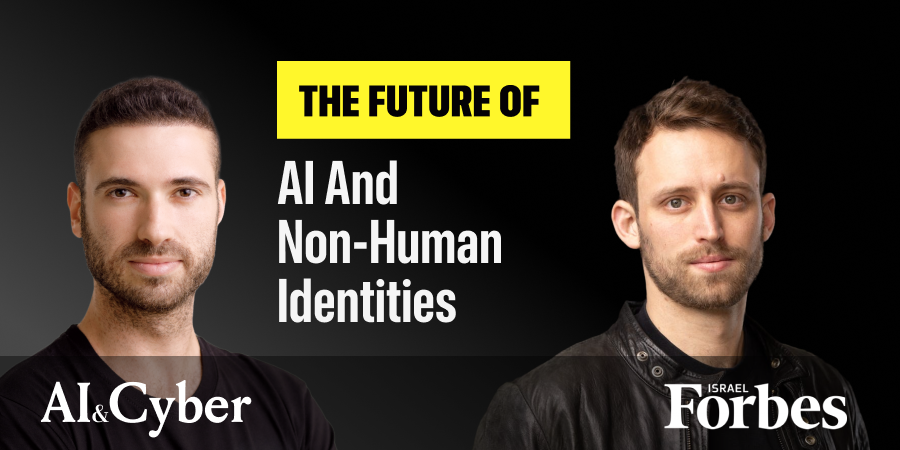Cybersecurity is undergoing profound transformation—especially when it comes to identity management. My recent conversation with Danny Brickman, CEO of Oasis, highlighted precisely how artificial intelligence (AI) is redefining this landscape. Brickman, whose journey from Ramat Gan to leading a thriving startup in New York uniquely positions him to speak on these shifts, provided key insights into how AI-driven changes are simultaneously reshaping both threats and defenses in cybersecurity.
Brickman emphasized an often-overlooked dimension of cybersecurity: non-human identities. Today, digital identities aren’t limited to humans; machines, applications, and automated systems exponentially outnumber human accounts within enterprises. Oasis, founded by Brickman, was among the first to recognize this emerging vulnerability. “We saw a big gap in identity management—non-human identities exponentially outnumbering human ones yet being overlooked by traditional security,” he explained during our interview.
As AI technology proliferates, the management of these non-human identities becomes increasingly complex, and failing to address this adequately leaves enterprises dangerously exposed. Brickman highlighted that the rise of generative AI, like GPT models, accelerated both the complexity of these identity challenges and Oasis’s own growth. “GPT’s release was personally transformative; organizationally, it accelerated both product innovation and operational efficiency, amplifying existing identity and permissions challenges massively,” Brickman noted.
The statistics are stark. According to recent industry estimates, non-human entities—such as bots, automation scripts, and AI agents—now represent over 70% of digital interactions within enterprises. Traditional security frameworks, designed with human-centric authentication processes, simply can’t keep pace. Brickman’s solution? Use AI proactively to manage and secure these identities effectively.
“Entrepreneurship is tough; simplifying it helps—enter familiar domains with trusted people,” Brickman reflected, highlighting the critical role of partnership and trust in building resilient cybersecurity frameworks. His own entrepreneurial journey, influenced significantly by his father’s story of immigrant determination and innovation, reinforces the idea that personal and professional resilience is central to navigating the rapid pace of technological change.
Brickman also underscored the necessity for continuous adaptability. “AI has changed the cybersecurity landscape, forcing startups to adapt dreams continuously,” he emphasized. I resonate deeply with this perspective. At Clarity, we’ve observed firsthand how swiftly AI-generated threats such as deepfakes and targeted phishing evolve. The only viable response is equally rapid innovation in defense strategies, employing AI to detect and neutralize threats proactively.
For Brickman, effectively responding to these rapid changes requires maintaining a balance between visionary innovation and practical, measurable progress. “You need metrics, stability, and the balance between vision and practicality,” he stated clearly. This duality defines successful innovation in cybersecurity today—strategically harnessing AI’s potential without losing sight of immediate security needs.
Reflecting on our conversation, it became clear to me that the cybersecurity landscape is at a critical inflection point. Organizations failing to adapt quickly to the new identity security paradigm risk severe exposure. The successful cybersecurity strategies of tomorrow will rely heavily on proactive, AI-driven management of both human and non-human identities.
The urgency is real, and the implications are immediate. As Brickman wisely pointed out, companies must continually refine their strategies in real-time, embracing AI not as an add-on but as a central component of their security infrastructure. Those who do will find themselves not only protected but uniquely positioned for future growth.
In cybersecurity, the pace of change means survival depends on swift, intelligent adaptation. AI-driven identity security, as Brickman and I both see it, isn’t just advantageous—it’s imperative. Organizations must act decisively now or risk falling irreversibly behind.
Michael Matias is the CEO and Co-Founder of Clarity, an AI-powered cybersecurity startup backed by venture capital firms including Bessemer Venture Partners and Walden Catalyst. Clarity develops advanced AI technologies protecting organizations from sophisticated phishing attacks and AI-generated social engineering threats, including deepfakes. Before founding Clarity, Matias studied Computer Science with a specialization in AI at Stanford University and led cybersecurity teams in Unit 8200 of the Israel Defense Forces. Forbes Israel recognized him early on, naming him to the exclusive 18Under18 list in 2013 and the Forbes 30Under30 list thereafter. Matias authored the book Age is Only an Int and hosts the podcast 20MinuteLeaders.





